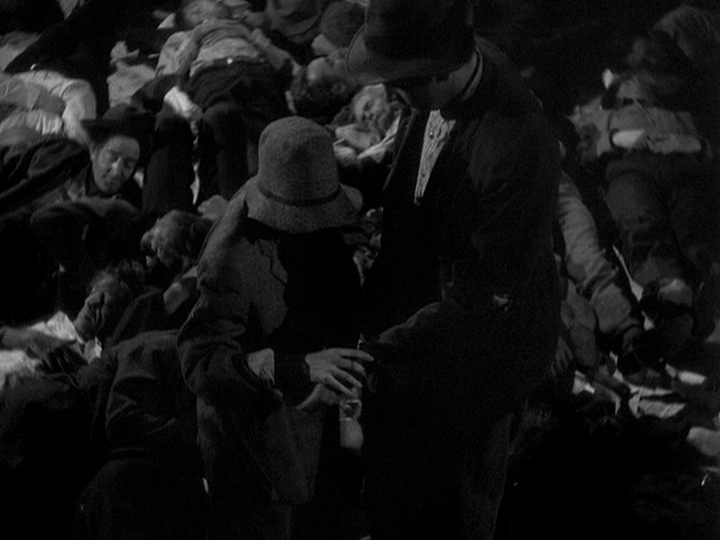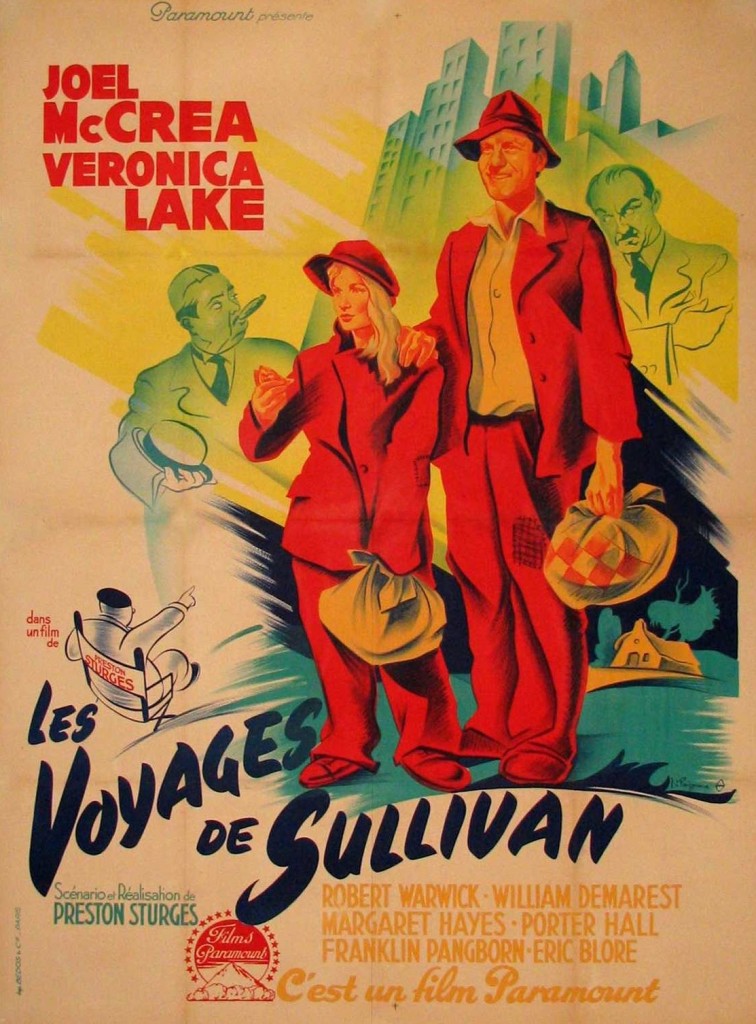 Most every account of Sullivan’s Travels describes the movie as being something between autobiography and artist’s testament. It’s easy to see why: the central character, John L. Sullivan, is a comedy director whose string of uncomplicated hits has pleased the studio but left the man deeply unsatisfied. Sullivan sets out to make his first serious movie, O Brother, Where Art Thou?, a raw examination of uncomfortable times. And likewise laugh maestro Sturges carves out a new and grim register—a socially conscious contemporary portrait. (With a little sex in it.)
Most every account of Sullivan’s Travels describes the movie as being something between autobiography and artist’s testament. It’s easy to see why: the central character, John L. Sullivan, is a comedy director whose string of uncomplicated hits has pleased the studio but left the man deeply unsatisfied. Sullivan sets out to make his first serious movie, O Brother, Where Art Thou?, a raw examination of uncomfortable times. And likewise laugh maestro Sturges carves out a new and grim register—a socially conscious contemporary portrait. (With a little sex in it.)
 Everyone assures Sullivan that he underrates comedy; only a highly paid Hollywood professional would be so aloof to think that the common man prefers a dash of humanly-scaled cinema-soot to a good chuckle. By the end of Sullivan’s Travels, we may as well concede the point, too: a Pluto cartoon (and a very unfunny one, at that) earns pride of place in a rural black church, with no competing tract in sight. I may falter sometimes, Sturges seems to be saying, I may fall prey to Social Significance now and again, but I don’t doubt that comedy is king. Don’t you doubt it either—I’m doing my part, in my way.
Everyone assures Sullivan that he underrates comedy; only a highly paid Hollywood professional would be so aloof to think that the common man prefers a dash of humanly-scaled cinema-soot to a good chuckle. By the end of Sullivan’s Travels, we may as well concede the point, too: a Pluto cartoon (and a very unfunny one, at that) earns pride of place in a rural black church, with no competing tract in sight. I may falter sometimes, Sturges seems to be saying, I may fall prey to Social Significance now and again, but I don’t doubt that comedy is king. Don’t you doubt it either—I’m doing my part, in my way.
It’s a testament to the complexity and craft of Sullivan’s Travels that this clean, somewhat self-aggrandizing thesis falls far short in describing what’s going on here. Sturges hardly practices what he preaches; one doesn’t leave Sullivan’s Travels complaining about all the hobo stuff and longing for an extra reel of slapstick. (Indeed, the latter sequences rival “Playful Pluto” in provoking a non-reaction among modern audiences. As Otis Ferguson aptly noted in his mixed review of Sullivan’s Travels, “when [Sturges] wants fun in a swimming pool, no less than four people have to fall or be pushed in.”)
Sullivan is also rather an inapt surrogate for Sturges. Much as he would later complain of his scripts being insensitively treated by other directors in the decade before he commanded the megaphone himself, Sturges’s 1930s output in no way resembles Sullivan’s Hay Hay in the Hayloft or Ants in Your Plants of 1939. (For what it’s worth, it was Preston Black accorded the unenviable reins of the Three Stooges’ 1936 two-reeler “Ants in the Pantry,” depths to which Sturges never sank.) Indeed, Sturges received sole credit and a percentage of the gross on The Power and the Glory and got the chance to adapt Ferenc Molnár for The Good Fairy. His two scripts eventually realized by Mitchell Leisen, Easy Living and Remember the Night, are elegant classics with adult concerns undiluted by lowbrow concessions.
